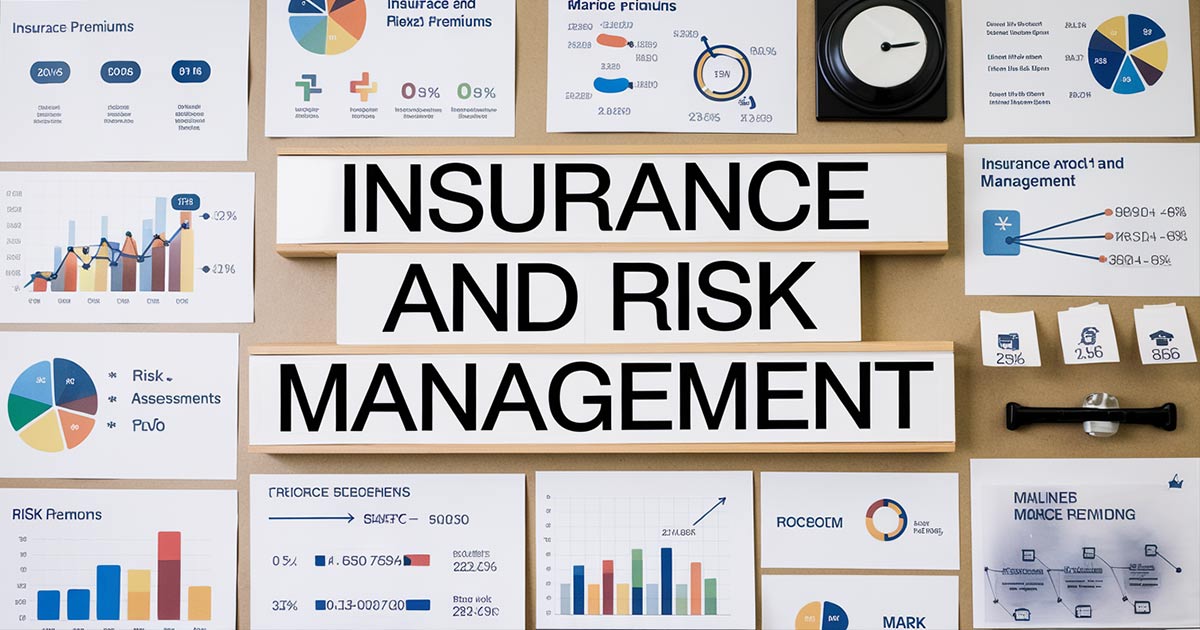
Advance Diploma in Insurance and Risk Management (ADI&RM)
By NCTA Team Last Updated: January 16, 2026Overview:
Advanced Diploma in Insurance and Risk Management is a one-year program designed for individuals aiming to build expertise in the fields of insurance, risk assessment, and mitigation strategies. This course, offered by the National Council of Training Academy, provides in-depth knowledge of the insurance industry, risk management principles, and the tools needed to evaluate and manage financial, operational, and strategic risks in various sectors.
Students will gain a strong understanding of insurance products, policy formulation, underwriting, claims management, and regulatory frameworks. Additionally, the course covers risk identification, analysis, and control measures essential for businesses and organizations to minimize potential losses and ensure sustainable growth. Practical case studies and industry-specific scenarios will prepare students to tackle real-world challenges in the insurance and risk management domains.
By the end of this program, students will be well-equipped to pursue career opportunities in the insurance and risk management sectors, as well as related industries such as finance, healthcare, and corporate risk management.
Course Curriculum:
This course provides students with an in-depth understanding of how insurance products work, the principles behind risk management, and how to mitigate risks effectively in various sectors. Below is the detailed curriculum:
- Introduction to Insurance and Risk Management:
- Overview of the Insurance Industry
- Fundamentals of Risk Management
- Types of Risks: Operational, Financial, and Strategic Risks
- The Role of Insurance in Risk Mitigation
- Regulatory Environment and Legal Aspects of Insurance
- Principles of Insurance:
- Basic Principles of Insurance: Insurable Interest, Utmost Good Faith, etc.
- Insurance Policies: Life, Health, Property, and Liability
- Underwriting Process and Risk Assessment
- Claims Management and Settlement Procedures
- Risk Pooling and Loss Prevention
- Risk Identification and Assessment:
- Techniques for Identifying Risks
- Risk Mapping and Risk Matrix
- Quantitative and Qualitative Risk Assessment
- Risk Scoring and Prioritization
- Financial and Operational Risk Assessment
- Risk Control and Mitigation:
- Risk Control Techniques: Avoidance, Reduction, and Transfer
- Crisis Management and Business Continuity Planning
- Loss Prevention Strategies
- Role of Insurance in Risk Transfer
- Technological Tools for Risk Management
- Financial and Operational Risk Management:
- Market, Credit, and Liquidity Risks
- Operational Risks in Business Processes
- Risk Analysis Techniques: Monte Carlo Simulations, Sensitivity Analysis
- Managing Risk in Financial Institutions
- Emerging Risks: Cybersecurity, Climate Change, and Geopolitical Risks
- Advanced Insurance Products and Strategies:
- Life and Health Insurance Products
- Property and Casualty Insurance
- Reinsurance: Concepts and Market Practices
- Risk Financing and Captive Insurance
- Regulatory Frameworks in Global Insurance Markets
- Industry-Specific Risk Management:
- Risk Management in Healthcare and Pharmaceuticals
- Insurance and Risk Management in Manufacturing
- Financial Services: Risk Management in Banks and Insurance Companies
- Risk Management in Construction, Real Estate, and Infrastructure
- Energy, Oil & Gas Industry Risk Management
- Practical:
- Emphasis on assessing the risks, evaluating insurance policies, and identifying gaps in risk management practices.
- Discussion and presentations on lessons learned from past insurance claims, disasters, or risk management failures.
Career Opportunities:
Potential career paths include:
- Risk Manager: Oversee and manage risk mitigation programs for organizations.
- Claims Manager: Manage and evaluate insurance claims to ensure proper processing.
- Insurance Consultant: Advise clients on selecting suitable insurance policies.
- Reinsurance Specialist: Transfer and manage risks between insurance companies.
- Loss Prevention Specialist: Implement strategies to minimize organizational risks and losses.
- Compliance Officer: Ensure adherence to legal and regulatory requirements in insurance and risk management.
- Financial Analyst: Analyze financial risks and develop strategies to reduce potential losses.
- Business Continuity Manager: Develop plans to ensure business operations continue during crises.
- Risk Management Consultant: Provide expert advice on risk identification, evaluation, and management.
Salary Expectations:
Salary expectations after completing the Advanced Diploma in Insurance and Risk Management vary based on job role, experience, and location. Entry-level positions such as Insurance Underwriter, Claims Manager, or Risk Analyst can expect salaries ranging from $30,000 to $50,000 per year, while mid-level professionals like Risk Managers and Business Continuity Managers can earn between $50,000 to $80,000 per year. Senior roles such as Reinsurance Specialist or Cyber Risk Manager may command salaries exceeding $100,000 annually, depending on industry demand and expertise. Salaries may also vary across sectors, with higher pay potential in financial services, insurance firms, and multinational corporations.
Course Features
| Course Code | NCTA-453 |
| Duration | 1 YEAR/540 HOURS |
| Category | Advance Diploma in Insurance and Risk Management (ADI&RM) |
| Eligibility | XII from recognized board |
| Fees | 15000/USD-270 |
To know more about our this course, feel free to call us at:
+91 9733600770Ready to Enroll in This Course?
Start your learning journey today and unlock your potential!
Apply Now for This CourseCurrent Job Opportunities for This Course
City Manager – Logistics & Last Mile Operations
Flipkart Bengaluru, KarnatakaFlipkart is hiring a City Manager in Bengaluru (Bommasandra) to manage city hub logistics, last mile delivery operations, and team performance in a fast-paced e-commerce environment.
Read MoreFreelance Recruiter (Work From Home)
ALVINEIENT Remote (Hiring office located in India)ALVINEIENT is hiring freelance recruiters to manage end-to-end recruitment and interview scheduling with payouts for every successful placement.
Read MoreSupervisor – Guest Relations (Aviation & Hospitality)
Adani Group Lucknow, Uttar PradeshAdani Group is hiring a Supervisor – Guest Relations for its aviation operations in Lucknow. The role focuses on delivering exceptional guest service, managing inquiries, coordinating services, and ensuring high guest satisfaction within an airport hospitality environment.
Read MoreHr Executive And Generalist
Flipkart Delhi / NCRFlipkart is hiring HR Executive & Generalist professionals for its HR Business Partner role in Delhi/NCR. The position involves managing HR operations, employee relations, hiring coordination, grievance handling, and exit processes. Ideal for candidates with 1–2 years of HR experience.
Read More



